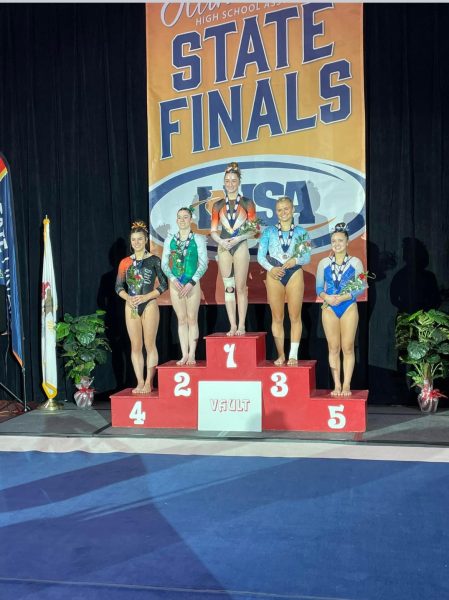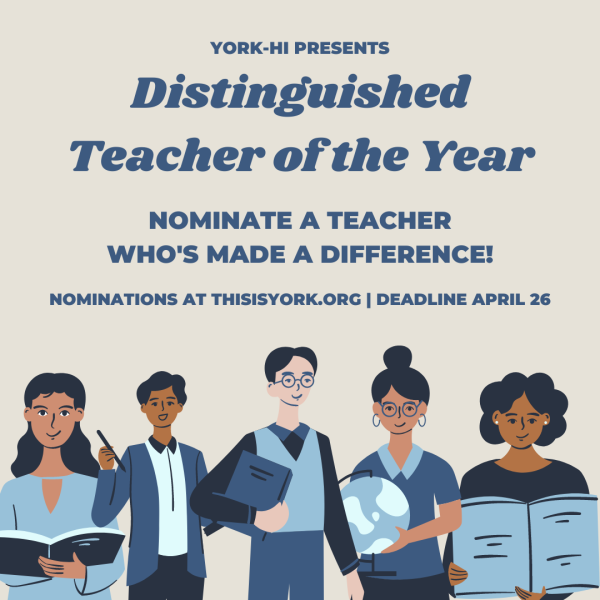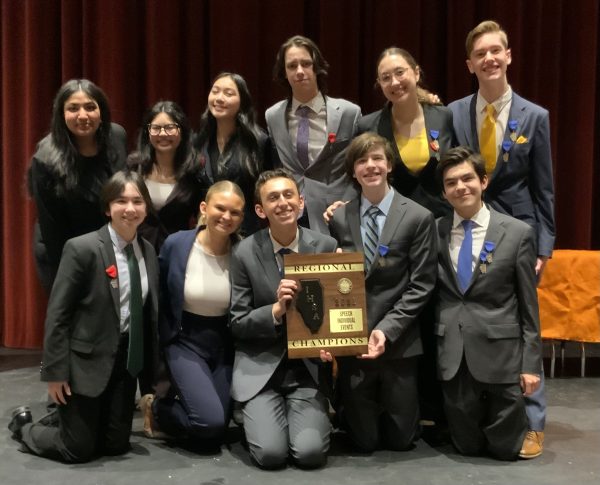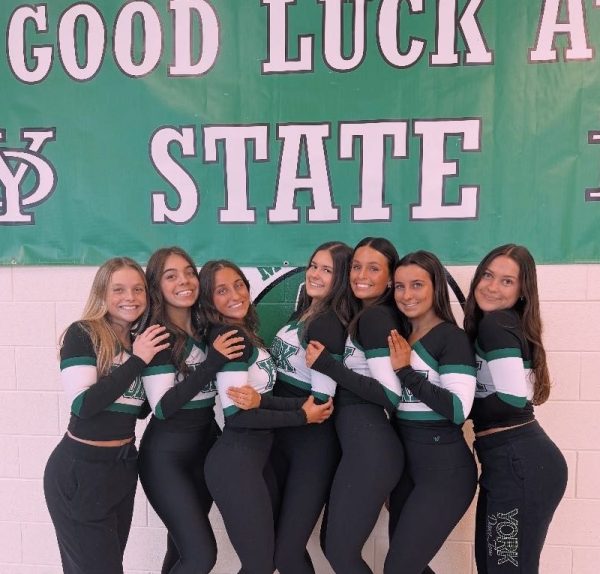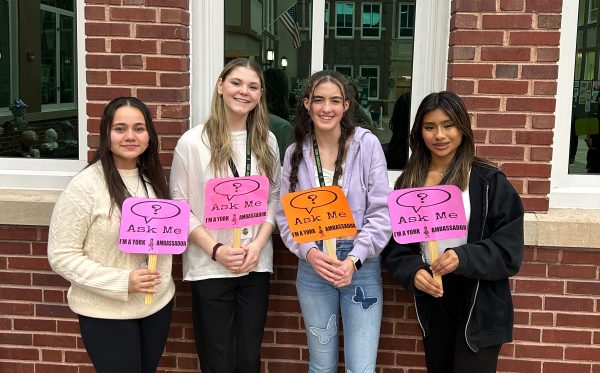Oh, the places you’ll go! (Even without going to college).
In less than two months, seniors will be sporting their apparel that represents the college they decided to commit to. Whether it’s the University of Illinois orange or the University of Iowa yellow, students won’t back down when it comes to expressing their true (school) colors.
However, college isn’t the only option for some seniors.
In a survey that was taken by the Class of 2018, it was discovered that 92.8% of students plan to attend a 2-year or 4-year college, 1.3% plan on enlisting in the military, .7% plan to work with community service on a mission trip, 2.6% will be working, and another 2.6% will be taking a gap year. To receive a better insight on this data, Mrs. Amy Thompson, the college and career counselor at York, provided her view on students who choose to go down an alternative route after they graduate.
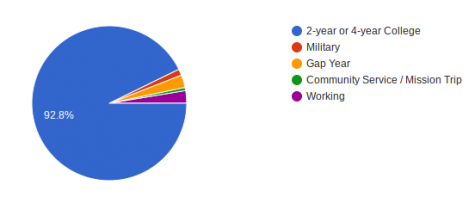
“I worry that sometimes kids fall into this automatic thinking, instead of what’s really right for them, because there are lot’s of viable options for students,” Thompson said.
Among the seniors who have decided not to attend college immediately after high school, there stand some concerned adults as to whether one can be successful with this kind of decision. They may be worried the individual will not be able to obtain a steady-income job or receive certain kinds of credentials from college that adults may need to survive in the real world.
“Some parents worry that you’ll lose momentum. While some people may need special training in a certain field with a college degree, there are some companies that if you get in and you’re a good worker, and they have management training programs, then that’s definitely possible [to find a job],” Thompson said.
While Thompson is optimistic about finding employment without a college degree, she shines a light on those who decide to take a gap year and how it may benefit them.
“Some kids decide to do that gap year. They have an interest in a certain area, and there’s a gap year program in that area. Rather than go to college and spend a lot of money, they could maybe spend less in something that allows them to actually try a field,” Thompson said.
It was recorded in the survey that about four seniors, which makes up around 2.6% of the graduating class, plan to take a gap year after they graduate. York alum James Foreman, who graduated with the Class of 2016, provided his insight on how his gap year benefited him is a copious amount of ways. Even so how it changed him spiritually.
“Realistically, I had no idea what I was doing yet. One day, my mom got a phone call from an organization called Leadertreks, and I had gone on a mission trip with them a few years earlier,” Foreman said. “I had only fragments of information. I was determined to understand why or who was contacting me. When I looked up the program, I was amazed. It was a year-long journey where I would be involved in all sorts of wilderness pursuits, adventures, and spiritual guidance.”
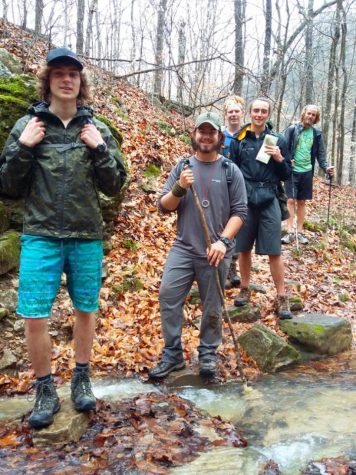
York alum James Foreman (far left) stands with his fellow members on his expedition as a part of their Leadertreks mission trip.
While Foreman was hesitant to explain to curious peers what he was doing after he graduated, he was confident in his decision for taking this gap year before he would attend University of Colorado, Colorado Springs.
“I soon found that people were very interested in the gap year program,” Foreman said. “The more I talked about it, the more people were interested and everyone said I should do it and it sounded perfect for me.”
Foreman’s gap year was centered around a mission trip expedition that he was accepted into through multiple interviews. While many may think that taking a gap year simply consists of traveling, Foreman’s experience with traveling was much different than anyone could imagine.
“I think one important thing is when I tell people I took a gap year, they often think I just took a year off and traveled around, which is all good and fun, but it was definitely important that I had a purpose and a plan. Otherwise, you could easily get lost,” Foreman said, looking back on his adventures. “Traveling is essential. It provides an endless opportunity for growth. Seeing different cultures and perspectives even within our country is really eye opening and humbling.”

Foreman’s Leadertrek group relax in a hot spring during one of their many ventures around the country.
Although taking a gap year is growing increasingly popular for high school graduates, many others are working after graduation so they can get the experience of working with internships or unions. Senior Ian Sebastian, whose passion for woodworking and creating things with his wood shaving-dusted hands led him to decide on his future with doing what he’s passionate about.
“The plan is to go and get an apprenticeship at a carpenters union, which is a four-year program. At the same time, I’m hoping to take online classes at COD and get an associates degree,” Sebastian said while measuring the cuts he made to his board. “They recommend you take fifteen credit hours, but I’m actually going to try and do eight a semester so that I can graduate in four years and be done with my apprenticeship and my associates degree at the same time.”
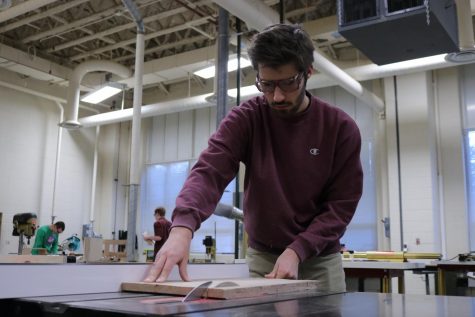
Senior Ian Sebastian cuts a plank of wood that he plans to piece together for one of his many projects.
Sebastian initially went on a couple tours, including Beloit College, where his older sister attends. He found that even by sitting through a couple classes and with thorough research, the college life just isn’t for him.
“I know every college is kind of different, but the general feel of it just didn’t stick to me,” Sebastian said.
Every student has different interests and passions, though. They may have been told that the things they love to do should be put to the side and be used as a hobby while they go out and find real work somewhere that can provide a decent salary. Sebastian refutes this idea as he expresses how his passions drove him to plan his future while maintaining a steady balance between working with his passion and ensuring that he’s happy.
“If you find something you love doing, it doesn’t matter how much it pays. The reward is in itself,” Sebastian optimistically said, making the final cuts on his piece.
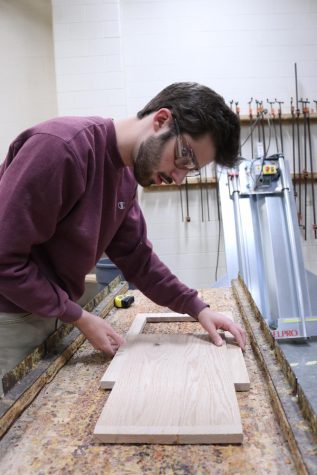
Sebastian fits his cut with another piece. His experience with wood tech has inspired him to work with his passion as a profession after high school.
Since these young adults were kids, they might have been told that the right path to go down after high school is to receive a degree in your desired field, or preferably one that can help you get a career that will provide you with an influx of zeros in your paycheck. As these kids grow into their mature mindsets, they’re left to make one of the most important decisions of their lives. Making plans for the future can be overwhelming for a lot of people. Attending a college has been the route that’s been advertised more than anything else to young people, and sometimes it simply doesn’t suit the ideals of some and they may choose not to attend due to the expenses. Our generation has had more options than ever before, though, and young people are using their freedom for choosing what they know is best for them.
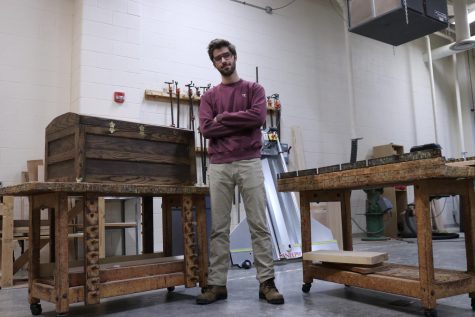
Sebastian proudly posed beside his most recent project, a chest that he has built which took him months to complete.
Amy Thompson, who always sees the light at the end of everyone’s tunnel, gave one last piece of advice for those who are unsure of attending college just a few months after graduation. “Sometimes, getting away from the routine of everyday life can give you a little more clarity about what you want.”
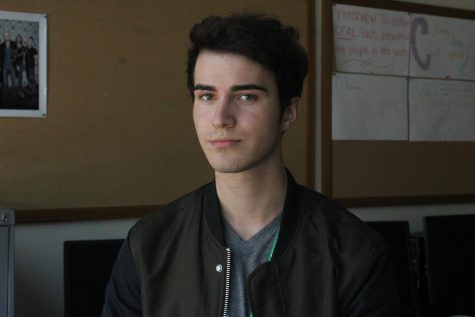
Nate Swanson is a senior at York, and this is his first year on staff. He's also a part of Mirrors Magazine and Fine Arts Week Committee. When he's not...






